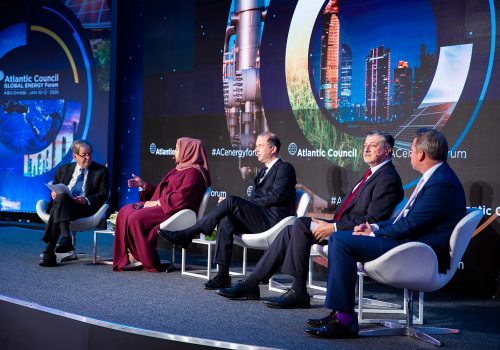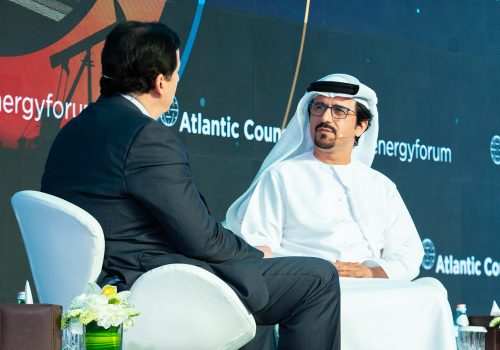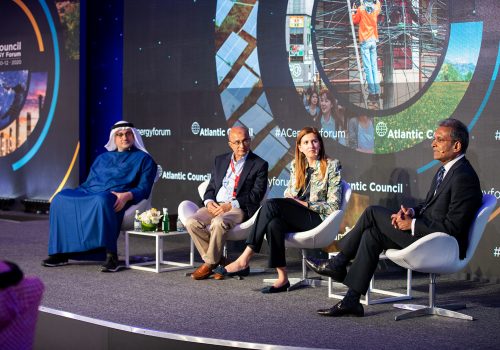Buoyed by ample supply, global energy markets continue to underestimate risks to output from the Middle East, despite the recent escalation in tensions between the United States and Iran.
This disconnect between risk and prices was highlighted in September when Iran launched an audacious coordinated attack using drones and missiles to hit Abqaiq, Saudi Arabia’s largest crude oil processing facility.
The attack knocked out nearly 6 million barrels per day (b/d) of supply but barely raised oil prices by $5 a barrel. Saudi Aramco tapped into its considerable inventories to supply full volumes of oil to its customers in order to avoid a global energy shortage and within weeks declared that it had restored the Kingdom’s oil production capacity to 11.3 million b/d, near pre-attack levels.
“This was the worst incident we’ve seen in terms of supply disruptions, and yet the effect was so transitory,” said Dr. Helima Croft, managing director and global head of commodity strategy, global research, RBC Capital Markets, LLC. Croft spoke as part of a panel at the Atlantic Council’s Global Energy Forum in Abu Dhabi, United Arab Emirates on January 12.
Complacency over risks and the belief that the market is abundantly supplied has meant that oil prices can no longer be used as a barometer of stability in the region. Instead of rising in anticipation of potential disruption, the market now reacts, briefly, before falling back on fundamentals. This is a very different dynamic to just a few years ago.
Earlier this month, US drones launched an unexpected attack in Iraq, killing Qasem Soleimani, one of Iran’s most influential military officials. Many commentators feared the onset of World War Three.
“And as extreme a view as that was, the minute the [retaliatory] missile attack happened on airbases in Iraq the view was it’s over—the escalation is over, this round is over, we’re back to where we were three months ago, everything’s fine, we’re back, the region is as normal,” said Amos Hochstein, senior vice president, marketing, Tellurian Inc. and a former top energy diplomat under the Obama administration.
Both reactions look equally flawed. “We are back to the same point that Iran is facing crippling sanctions without a clear path out of it, and it needs to get a clear path out of it. And if we don’t provide one, they will try to create one,” argued Hochstein.
Iraq’s vulnerabilities exposed
Soleimani’s Al-Quds Force, the international wing of Iran’s Islamic Revolutionary Guards Corps, hold sway over Iraq’s militias, as well as influencing proxies across the region, from Syria and Lebanon to Yemen.
With dozens of sympathetic militias, as well as considerable US interests, Iraq is a likely battleground. Along with militia attacks, any upheaval in Iraq could also risk recreating the conditions which allowed the rise of the Islamic State militant group. Both would imperil Iraq’s existing fragile oil sector and have a paralyzing effect on key upstream oil projects.
Unlike Saudi Arabia, Iraq would not be able to quickly recover from any attacks.
“I don’t think it’s clear at all that they [Iraq] have the type of redundancies that they could recover from it, again. And so I do think that we still have to be concerned about the Iranians going back to the more shadow wars in terms of the effects that could have on infrastructure, and Iraq is where I am most concerned,” warned Croft.
Beyond Iraq, there is an array of critical energy infrastructure across which remains vulnerable, which paradoxically, the oil markets do not appear to have priced in.
“There is this idea that we can have it both ways, believing that the US conflict with Iran will continue, that there will be retaliatory attacks, but also that the price of oil will remain that same as it is today,” said Hochstein. It is wishful thinking.
The impact of US energy independence
Some of this is due to the remarkable rise of shale production in the United States, which has turned its “energy independence” mantra into more of a reality.
“The market is still catching up to the United States. It is here, it is secure, and it is able to respond to market conditions,” said Francis Fannon, assistant secretary in the Bureau of Energy Resources at the US Department of State.
US imports of crude from the Gulf have fallen from 2.8 million b/d in 2000, to just 1.6 million b/d in 2018. Data from the first ten months of 2019 show imports have slipped further to around 900,000 b/d.
Gulf imports still matter, of course, particularly the region’s heavier crude barrels, which US refiners are set up to process. But the import numbers point to a deeper concern among US allies about the nature of their relationship, long thought of as an unwritten covenant—the supply of stable barrels of crude oil, in exchange for security.
Many in the Gulf are now asking if they can rely on the United States in a time of crisis if they are no longer necessary for the US economy. Washington’s failure to respond vigorously to Iran’s attacks on Gulf shipping and Saudi Arabia’s Abqaiq oil center reflects US President Donald J. Trump’s reluctance to intensify the White House’s involvement in Middle East conflict and dealt a further blow to relations between Riyadh and Washington.
Where exactly Trump’s red lines remain to be seen. Croft and others are not confident that the United States would respond to an energy infrastructure attack, particularly if it was carried out by proxy groups.
“There has been a very clear statement by the United States that the [Iranian] regime will be held accountable for what it does and what its proxies do, and that is a major change in terms of intent,” said General James L. Jones, Jr., executive chairman emeritus of the Atlantic Council.
Tehran would be “crazy” to think the situation was now back to normal and it can act with impunity against shipping or energy infrastructure in the region. “The regime is many things, but it is not stupid. It will do whatever it needs to do to ensure the regime survives intact,” Jones added.
The United States is set to continue ramping up pressure on Iran. “We are in a different world under our maximum pressure campaign,” said Fannon. So far, the campaign, launched since mid-2018, has achieved “remarkable” results in slashing Iranian crude oil and condensate exports and depriving Tehran of “tens of billions of dollars in revenues”, Fannon said, with further sanctions set to be enforced.
New approaches to Gulf tensions
Masakazu Toyoda, chair and CEO of the Institute for Energy Economics Japan, reflects the view from Asia, a region which, unlike the United States, has become ever more dependent on energy supplies from the Gulf.
Japan is engaged in a sort of “economic diplomacy, peace diplomacy,” he explained. One example is the common challenge of climate change. “What we can do is to decarbonize hydrocarbons and produce hydrogen from fossil fuel with carbon capture and storage (CCS). We are working closely with many countries in this region, and also help them diversify their economies.” The efforts are aimed at reducing the Gulf’s dependence on oil.
“I don’t think that military force will stabilize this region. Only prosperity would stabilize this region,” he added.
Europe represents another alternative perspective on this. The continent has learnt bitter lessons over the last decade on managing through disruptions after Russia cut off natural gas supplies through Ukraine.
While painstakingly negotiating new terms for piped gas supplies, European countries since have built a raft of new liquefied natural gas terminals, which will take advantage of rising supplies, from Qatar, Australia, and the United States. The European Commission also demands its member states maintain oil reserves up to ninety days.
“Since then we have invested in the interconnections, so that if one member state faces a problem, another one can help. And we have diversified our routes so that—well, it’s not wise that if you are dependent on one single provider,” said Kadri Simson, Commissioner for Energy, European Commission.
Adal Mirza is a UAE-based journalist and writer.
Further reading
Image: US Department of State Assistant Secretary for the Bureau of Energy Resources Francis Fannon speaks at the Atlantic Council Global Energy Forum in Abu Dhabi, United Arab Emirates on January 12, 2020.



